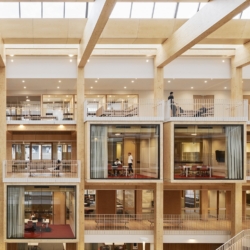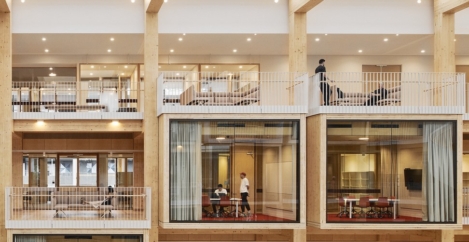November 7, 2024
University staff love to connect on campus, but also value time working from home
 A new report from Hassell, the 2024 Education Futures Survey, explores how hybrid working is reshaping the needs and expectations of Australian university staff. Based on responses from 300 university employees and a benchmark group of 500 office workers, the survey reveals distinct trends in campus work culture and the growing preference for in-person interactions among academic staff, coupled with a desire to continue working from home when needed.
A new report from Hassell, the 2024 Education Futures Survey, explores how hybrid working is reshaping the needs and expectations of Australian university staff. Based on responses from 300 university employees and a benchmark group of 500 office workers, the survey reveals distinct trends in campus work culture and the growing preference for in-person interactions among academic staff, coupled with a desire to continue working from home when needed.
While hybrid work has become the dominant model across many industries, universities present a unique environment. The survey found that 72 percent of university staff work in a hybrid manner, splitting their time between working from home and on campus, compared to 43% of office workers. Around 44% of university staff indicated a preference for spending more time on campus, contrasting sharply with corporate office workers, who generally favour remote work.
This desire to be on campus appears driven by the social and collaborative nature of academic work. According to the report, university employees strongly value face-to-face engagement with colleagues and students. Tasks involving direct interaction, such as teaching, supervising, and collaborating, are seen as best performed on campus. This marks a key difference from office workers, who tend to prioritise flexibility and remote work for tasks that don’t require in-person presence.
Despite the rise of flexible work, university campuses still rely heavily on traditional office layouts, particularly private offices. The survey shows that half of the university employees surveyed have their own private office, and an additional third work in shared offices. This differs from the corporate sector, where open-plan offices have become more common. Many academics view private offices as essential not only for focus but also as a symbol of status and academic rank. The study found that most staff members are hesitant to relinquish their private offices, even when offered benefits like a pay increase or the chance to work in carbon-neutral spaces.
Environmental consciousness emerged as a strong value among university employees. Around half of the respondents expressed concern about climate change, and many reported an awareness of the environmental impact of commuting and using single-use plastics. However, the survey noted a gap between staff’s environmental values and actions in the workplace. For example, although a large proportion expressed concern for climate impact, only 22% were concerned about the environmental cost of maintaining underused private offices. This highlights a potential area for universities to educate staff on the carbon footprint associated with underutilised office space.
Wellness is also a priority for university employees, who are increasingly seeking workplace environments that support health and wellbeing. Practical amenities such as fresh air, green spaces, and high-quality food options are highly valued. The report suggests that the pandemic has shifted expectations, with employees now comparing campus amenities to comforts available at home. For university administrators, integrating these wellness-focused features could be key to enhancing campus appeal and retaining academic staff.
The findings underscore that while working from home is important to people, universities have a unique opportunity to define campus spaces as hubs of collaboration, connection, and wellness. The report concludes that, by fostering a campus culture that supports these elements, universities can offer an attractive environment that aligns with the distinct needs of academic staff and adapts to the evolving workplace landscape.
















